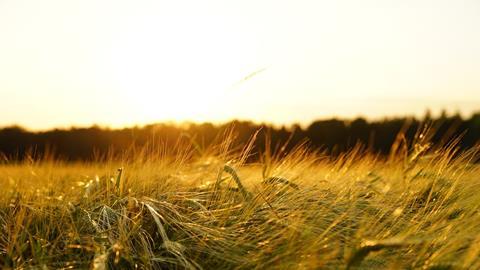When Miranda Adderley was told that her unborn grandson was unlikely to survive outside the womb, she organised a countryside retreat for her family. Together, they processed their grief in the beauty of nature, and slowly learned to see the goodness of God again
We are an ordinary family. Mum, Dad, four daughters and a wee grandson. We’ve had our share of grief and worry over the years, but nothing prepared us for the shock of discovering that our second grandchild had the chromosome condition Trisomy 18, known as Edwards’ syndrome. In the months that followed, scan after scan showed that Joseph Jesse had serious cardiac and digestive abnormalities and life outside the womb would be fleeting at best.
How do you prepare for something like this? We were at a loss and grieved both the imagined future of a second beloved grandchild and the trauma our daughter was facing.
We are a family of planners; diaries are shared and dates booked a year ahead. So this situation, utterly out of our control, left us reeling and directionless.
In her book on her own experience of baby loss, Perfectly Human: Nine months with Cerian (Plough Publishing House), Sarah C Williams writes about the family finding safety and refuge in her mother’s countryside home. Inspired by this, we booked a converted barn on a farm in North Devon. Our daughter and son-in-law work for the church and their home is their workplace. So here was somewhere they could retreat and rest, as well as a base for us near them, rather than 500 miles away in our own Edinburgh home.
Hills and valleys
Hidden Valley Farm is nestled deep in the Devon countryside between green hills. The soil is iron red, turning from rusty rivers to clay, to dust and back again in the spring showers. The converted barn has old oak beams and a beautiful gallery linking the bedrooms in the eaves above. The floor is flagged with stone quarried locally and bears its mark as red dust gathers with each sweep of the broom.
We arrived before Joseph was born. Anxious days were spent with our pregnant daughter, who was uncomfortable and in pain from the huge amount of fluid gathering around her tiny boy. She rested in the light of the barn and we began to explore. Everything was garlanded in yellow. The palest primroses bloomed profusely on banks and hedgerows, a carpet rolling before us as we drove down narrow lanes. Bright yellow daffodils swayed in the March gales alongside miniature narcissi, yellow and two-tone orange and white.
Nothing grows on mountaintops. It’s the valleys that are abundant and fruitful
One week later, Joseph’s birth and death shattered us. Numb, disorientated and desolate, we found calm for a few days in the amazing Children’s Hospice South West before limping back to the farm. We began to roll through the days in the shelter of this place, repeating the same simple journeys around the farm. Heading out across the yard past the sheds, we were greeted with ducks and hens squawking a threat or welcome. Beyond, the hills rose steeply and we climbed and watched the beautiful Suffolk Punch horses grazing, their red coats glinting. Sometimes they galloped, huge hooves thundering, echoing from hill to hill.
We circled round to visit the five Dartmoor ponies in the barn, wild manes tangled with straw. Three foals were born during our stay. They were remarkable creatures, staggering to their feet minutes after birth. Within days they were bold and curious, sniffing our hands. Their black bright eyes had only seen this valley.
At the top of the hill we found the pigs. The adult boars and sows were hefty and fearsome. They were enthusiastic in their welcome and ugly as anything. Five hoglets, penned separately, rushed to meet us, squeaking and grunting. They frightened easily but always came back. Every day we chatted to them and our grandson loved to tell them Fireman Sam stories. The farmer, the kindest of men, let him play on his tractor, which became a place of adventurous imaginings. Day after day we tramped across these steep fields with the dogs, wind in our faces. We looked across the valley and didn’t really go anywhere else. The month gathered pace while grief remained stubbornly slow. Alongside the foals, chicks were hatched and another litter of piglets arrived. Tiny purple flowers joined the yellow in the hedgerows.
This place held us in our grief by stringing together small days of ordinariness. Nature’s rhythms and beauties provided the green screen for our loss. The farm’s eggs and sausages gently nudged our appetite back, alongside gold standard grief gifts from friends who tracked us down: a basket of fruit, a bottle of Vietnamese gin, candles and homemade brownies. We ached at the injustice and brutality of death, yet were wrapped in abundant life on the farm. No calls, no visitors, no bills, no life admin, no big decisions. Only a pushing through each day, which was enough.

Anger and pain
I was angry and rejecting of God, disbelieving that a God of love could allow this to happen to us, but I cannot deny his presence with us in those days of pain and loss. Psalm 23 is known and loved and sometimes, in the arrogance of the time-served Christian, I have looked for “more interesting” passages of scripture. Yet, this time, its words have been real to me. “He leads me beside still waters” (v2, ESV); “Even though I walk through the valley of the shadow of death…you are with me” (v4, ESV). I inhabited Psalm 23 in our month at Hidden Valley Farm; I walked it, felt it, wrestled with it.
Eventually, I found a way to recognise again all that God has done for us
The geography and biology of the valley also challenged my desire for mountaintop experiences. In Walking Through Winter (Instant Apostle), the theologian Katherine Gantlett writes that, in fact, nothing grows on mountaintops. It’s the valleys that are abundant and fruitful. I thought more on that. Everyone loves a literal or metaphorical mountaintop. On top of the mountain, there is a huge sense of achievement; an adrenaline rush as you stand and admire an amazing view.
There’s little adrenaline in the valley; it can be dark and feel hemmed in. The mountaintop is a static place of momentary triumph but, by trudging through the valley, you find the unexpected. It’s a place where you can let feelings and thoughts ebb and flow. The physical reality of planting one foot in front of another as we walked around the farm brought a tiny piece of solidity when grief was swirling all around us. In the valley we found a place of change, growth and beauty where the grief work could begin.
As ‘Song of ascents’ by Hillsong United says: “From the gravest of all valleys / Come the pastures we call grace / A mighty river flowing upwards / From a deep but empty grave”.
Grace and beauty
After four weeks, we left the farm. We gave thanks for Joseph Jesse at a profoundly beautiful service and buried him in a country graveyard with a chorus of birdsong and an armful of daffodils.
After the funeral, I felt so distant from God. For weeks I could not find a way to pray as I felt so much prayer had been unanswered for us. I am not proud to say that I also found praying for others really hard at this time, resisting praying for a friend’s job application or appointment because it felt trivial in the face of our loss. However, by focusing solely on ‘thank you’ prayers for a time, I slowly found a way back to conversation with God. Some days I could only manage a brief thank you for a flower or my cup of tea but, eventually, I found a way to recognise again all that God has done for us. Gradually we picked up life and reconnected with people who love us.
One year on, some days are good and others are still brutally hard. We sometimes take our grandson back to Hidden Valley Farm and the farmer lets him play on the tractor again. It was delightful to see the primroses again this year, as well as the first foals and piglets being born. Nature’s sure rhythms were comforting as we approached Joseph’s first birthday. As family and friends we planted sunflower seeds, some of which bloomed. It has been helpful for us to establish such patterns of remembering. I stand a little further down the valley now and see that we are marked and changed as grandparents and parents. We have been able to reclaim joy and participate again in church, in family celebrations and all the good things that come our way. Yet we grieve for Joseph and still often weep at how hard it is for our girl and her boys.
Sometimes, when I think back, I cannot believe what we endured, how we survived, how we have come this far. I treasure our month at Hidden Valley Farm, which remains a significant place of remembering. I thank God (who, incidentally, I am still sometimes very angry with) for the gift of the valley.
Should you find yourself in the valley of grief and loss – today or some other day – I hope that this reflection helps a little. May you find grace and beauty in the ordinary, recognising the presence of God in the valley you wander.



































No comments yet